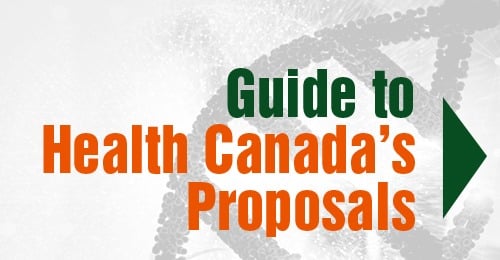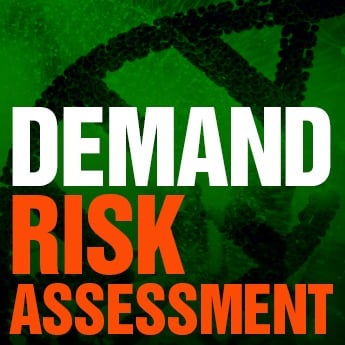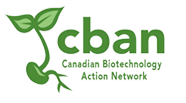Critical Update: Health Canada
Health Canada is proposing to remove regulation for some genetically engineered foods
Health Canada has launched a public consultation on a proposal to remove government oversight for some genetically engineered foods, particularly those produced through the new genetic engineering techniques of genome editing (also called gene editing). This proposal would allow some GMOs (genetically modified organisms) into our food system without any government safety assessments – these would be unregulated GMOs that the government may not even know exist.
Health Canada wants your opinion on proposals to:
- Allow some genetically engineered foods onto the market without government safety assessments
- Allow unregulated GMOs to go unreported to the government
- Conduct lesser safety assessments for GMOs that are similar (“identical”) to previously approved GMOs
Stop corporate self-regulation. Demand mandatory, independent risk assessments for all genetically engineered foods.
You can send your comments about the new proposals to Health Canada until May 24.
- Your comments can be submitted by email to Health Canada at hc.bmh-bdm.sc@canada.ca
- Click here to vist Health Canada’s consultation website
- Find more information and analysis below or click here for CBAN's overview and guide to commenting.
Add your voice for the future of our food and democracy
Overview
Health Canada has launched a public consultation on its proposal to remove government regulation of some genetically engineered (genetically modified or GM) foods.
If approved, the proposals would remove government oversight for some genetically engineered foods, allowing some GMOs (genetically modified organisms) into our food system without any government safety assessments – these would be unregulated GMOs that the government may not even know exist. These GMOs would be those that have no foreign DNA inserted and many are likely to be produced using the new genetic engineering techniques of genome editing, also called gene editing.
Health Canada’s proposals threaten food safety and democracy. Health Canada is proposing to abdicate its responsibility to ensure food safety and set a precedent of corporate self-regulation in the use of genetic engineering in our food system.
Government safety assessments already rely on confidential science submitted by product developers, but, if these new proposals go ahead, Health Canada will not even check this corporate science. Allowing corporate self-regulation would be a significant move away from government oversight and review by independent government scientists. Multinational biotechnology and pesticide corporations and their lobby group CropLife Canada have asked for these changes because seed companies want easier, faster regulations for genetic engineering and, in particular, the new genetic engineering techniques of gene editing.
Health Canada is proposing three changes:
- Allow some genetically engineered foods onto the market without government safety assessments: Health Canada is proposing to exempt some genetically engineered foods from regulation. This means that some GMOs would be allowed onto the market without government safety assessments. Specifically, Health Canada is proposing to allow product developers to assess the safety of their own GMOs if there is no foreign DNA inserted. This proposal overlooks the potential consequences of unintended and unexpected effects created by the process of genetic engineering, in this case, genome editing in particular (See CBAN’s report for discussion of the risks of genome editing). Click here for more information and analysis on this proposal.
- Allow unregulated GMOs to go unreported to the government: Health Canada proposes to set up a “Voluntary Transparency Initiative” that would not require, but would encourage private companies to voluntarily inform the government of any unregulated gene-edited GMOs that companies intend to put on the market. Click here for more information and analysis on this proposal.
- Conduct weaker safety assessments for GMOs that are similar (“identical”) to previously approved GMOs: Health Canada also wants to relax information requirements for the safety assessments of GM foods that have “identical” GM characteristics to those already approved. This proposal introduces “tiered” assessments that could mean “expediated service standards” (shorter timelines for a risk assessment) for some GMOs. More information and analysis on this proposal is forthcoming. Contact us if you have questions.
If accepted, these changes would set a critical precedent to allow corporate self-regulation of genetically engineered organisms. In fact, Health Canada’s consultation is the beginning of a multi-year process to “modernize” regulation for all GMOs, including GM seeds and GM animals. This is an important opportunity to press for transparency and strong regulation. 
Take some time now to tell Health Canada you want mandatory, independent safety assessments of all genetically engineered foods.
Please see below for more information on how to send your comment or click here for the full guide. The deadline to send comments is May 24, 2021.
How to Comment
It is easy to comment, and your comments matter. Your comments can be short and to-the-point because the proposals from Health Canada are straightforward (though they are written up in two documents that use some new and possibly confusing language). Your comments, in your own words, will be critically important.
Health Canada asks the public two questions (the other four questions are directed to product developers):
- “Does the guidance align with the goal of a regulatory approach that is based on the level of food safety risk posed by specific products of plant breeding?” i.e. Would the changes ensure food safety?
- “Does the voluntary transparency initiative serve its purpose to inform Canadians what non-novel gene-edited products are on the market? Can we do more to achieve this objective?” i.e. Would the changes give you enough information about unregulated GMOs on the market and, if not, how can Health Canada provide more transparency?
Your comments to Health Canada can answer these questions and go beyond, to express how you want decisions to be made about the use of genetic engineering in food and farming.
If you only have 5 minutes, you can email today:
Email today if you want Health Canada to assess the safety of all genetically engineered foods, including those produced through the new genetic engineering techniques of genome editing (also called gene editing). Email hc.bmh-bdm.sc@canada.ca and please add CBAN to the BCC info@cban.ca so we can see your concerns.
You can react to the proposals, and can also go further and use this opportunity to tell Health Canada how you want genetic engineering treated by our government. Here are some points of concern that directly relate to the proposals:
- Health Canada should conduct mandatory, independent safety assessments for all genetically engineered foods, including those produced by the new genetic engineering techniques of gene editing.
- It is Health Canada’s responsibility to ensure the safety of all the food in our grocery stores.
- Health Canada should maintain regulatory authority over all genetically engineered foods, including those produced by the new genetic engineering techniques of gene editing.
- Health Canada’s regulators should check the science behind all genetically engineered foods to make sure that products are safe.
- Independent science, not corporate science, needs to be behind all safety assessments.
Product developers should not be allowed to judge the safety of their own products without government checks. - The government needs to provide transparency to consumers and farmers by requiring companies to report any new genetically engineered foods they put on the market, for a public list.
- Health Canada should establish mandatory labelling for genetically engineered foods, including those produced through gene editing. This would provide Canadians with information about which GM foods are on the market, and where they are in our grocery stores.
Email today or send more detailed comments by May 24, 2021: See below for more background or click here to read more about the proposals. CBAN will also send detailed comments to Health Canada but it will take some time for us to put these together.
Background
What is happening?
- There are two consultation documents. The documents are available upon request from Health Canada or click here.
- There are three proposals in this consultation. The consultation documents are 6 and 19 pages each but the actual proposals in them are short. For example, the proposal on gene editing is summarized on one page: Section 3 on page 5 of the document on “plant breeding.” Click here for the consultation documents.
- CBAN will soon provide more detailed analysis of the proposals with more background information. Stay tuned to this newsletter and www.cban.ca/NoExemptions
- The deadline to send your comment is May 24, 2021.
Why is it happening?
- Multinational biotech and pesticide companies and their lobby group, CropLife Canada, have asked for these changes because companies want easier, faster regulations for the new genetic engineering techniques of gene editing in particular.
What is at stake?
- The role of government and the future of independent science: The public cannot rely on product developers and corporate science to ensure product safety – independent, peer-reviewed science and independent government oversight is essential to safeguarding public health.
- The role of the public in decision-making: Consumers and farmers should have input into decisions over the use of new technologies in our food system like genetic engineering, including to assess the question of need and the potential social and economic impacts.
- The future of food and farming: The new genetic engineering techniques of genome editing are powerful and could be used to produce many new GM foods, plants, and animals.
- Food safety: Safety issues could be missed if assessments of genetically engineered foods do not consider the potential unexpected impacts resulting from the process of genetic engineering, and if these assessments are carried out by product developers instead of independent government regulators.
Decoding Health Canada’s language:
- “Regulatory guidance”: The proposals are not changes to regulations, but would change the “guidance” document, which interprets the regulations and instructs regulators on how to assess GMOs for food safety.
- “Plant breeding”: The biotech industry and Health Canada often refer to the new genetic engineering techniques of gene editing as “breeding” methods, but this is not accurate or appropriate. Unlike breeding methods, genetic engineering techniques (including gene editing techniques) intervene directly in the genome to make changes.
- “Genetic modification”: The term “genetic modification” is commonly used interchangeably with “genetic engineering,” to refer to the new laboratory techniques of directly intervening in the genome of organisms to make changes. However, Health Canada uses the term “genetic modification” to refer to a broad category that includes conventional plant breeding as well as genetic engineering.
- “Biotechnology”: In the proposals, Health Canada does not use the term “genetic engineering” at all but instead uses the broader term “biotechnology.”
- “Pre-market notification”: When Health Canada refers to pre-market notification, they are referring to the process where product developers submit information on their GMO to regulators for safety assessment.
- “Retransformants”: This is not a common term, but Health Canada uses it for the purposes of regulation, to refer to plants that have been genetically engineered with the identical sequence of DNA as a previously-authorized plant of the same or similar species, to create the same GM trait.
For information on how genetically engineered foods are regulated in Canada, see CBAN’s report “Are GM Foods and Crops Well Regulated?”
For information on genome editing, see CBAN's report "Genome Editing in Food and Farming: Risks and Unexpected Consequences"
Support us today with your donation: www.cban.ca/donate

The Canadian Biotechnology Action Network (CBAN) brings together 16 organizations to research, monitor and raise awareness about issues relating to genetic engineering in food and farming. CBAN members include farmer associations, environmental and social justice organizations, and regional coalitions of grassroots groups. CBAN is a project of MakeWay's shared platform.





